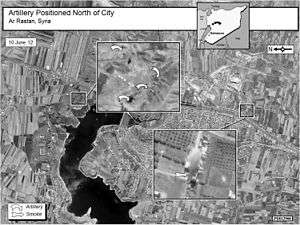May 2012 battle of Rastan
Coordinates: 34°54′55″N 36°44′08″E / 34.91525°N 36.735485°E
| May 2012 battle of Rastan | |||||||
|---|---|---|---|---|---|---|---|
| Part of the Syrian Civil War | |||||||
 Artillery positioned north of Rastan, Syria. Smoke rising from building, 10 June 2012. | |||||||
| |||||||
| Belligerents | |||||||
| Commanders and leaders | |||||||
| Colonel Qassim Saadeddine,[1] Ahmad Bahbouh | Unknown | ||||||
| Casualties and losses | |||||||
| 9 killed, including a rebel commander |
23 soldiers killed,[2] 15 captured | ||||||
The May 2012 battle of Rastan, took place on May 14, 2012, during the U.N. brokered cease-fire of the Syrian uprising.
Background
The area near Rastan was scene of the first serious armed confrontations between rebels and the Syrian army through 2011.[2] the Syrian army regained control of the city several times, but it has kept slipping back into rebel hands.[2] Its strategic location along the road which links the capital Damascus to the north of the country[3] and the terrain had helped deserters from disparate units mount raids against Syrian army buses and roadblocks manned by Military Intelligence and pro-government militia.[2]
Events
According to the Syrian Observatory for Human Rights, on May 14, twenty-three Syrian soldiers were killed in the town of Rastan in heavy clashes with rebels, who destroyed three armored personnel carriers. Earlier, opposition sources said a local rebel commander was among scores of people killed in heavy army shelling of Rastan, Reuters reported.[2] One report said nine peopled died in the shelling. An additional two military armored personnel carriers were reportedly captured by the rebels, along with 15 soldiers.[4][5]
Aftermath
In June Syrian troops bombarded Rastan using helicopters and mortars, killing and wounding a large number of rebel fighters, including Ahmed Bahbouh, head of the rebel military office in Rastan.[6][7] United Nations monitors confirmed that Syrian army helicopters fired on towns near Homs, including Rastan. For the first time, the UN also verified repeated allegations by activists that government forces fired from helicopters in the military crackdown on dissent. Kofi Annan said he was "gravely concerned" at this news and a UN spokeswoman said that "artillery and mortar shelling, machine guns and smaller arms" were being used against the towns of Rastan and Talbiseh.[8]
On July 13, a colonel with 40 soldiers and four tanks defected to the Free Syrian Army in Rastan. Rebel fighters also took control of the village of al-Ghantu, southwest of Talbiseh.[9]
References
- ↑ Matthew Weaver. "The Guardian Syria Live Blog". the Guardian. Retrieved 25 October 2014.
- 1 2 3 4 5
- ↑ "WEB NEWS - Syria: army intensifies attack on Rastan - France 24". France 24. Retrieved 25 October 2014.
- ↑ "Syrian soldiers 'killed' in Rastan clashes". Retrieved 25 October 2014.
- ↑ "BBC News - Battle for Syrian town of Rastan continues despite ceasefire". BBC News. Retrieved 25 October 2014.
- ↑ http://english.alarabiya.net/articles/2012/06/14/220695.html
- ↑ Independent Newspapers Online. "Suicide bomber strikes near one of holiest Syrian shrines". Independent Online. Retrieved 25 October 2014.
- ↑ "UN observers confirm Syria aerial attacks". 12 June 2012. Al Jazeera. Retrieved on 17 June 2012
- ↑ "Syrian Daily Round-up - 13 July". Retrieved 25 October 2014.